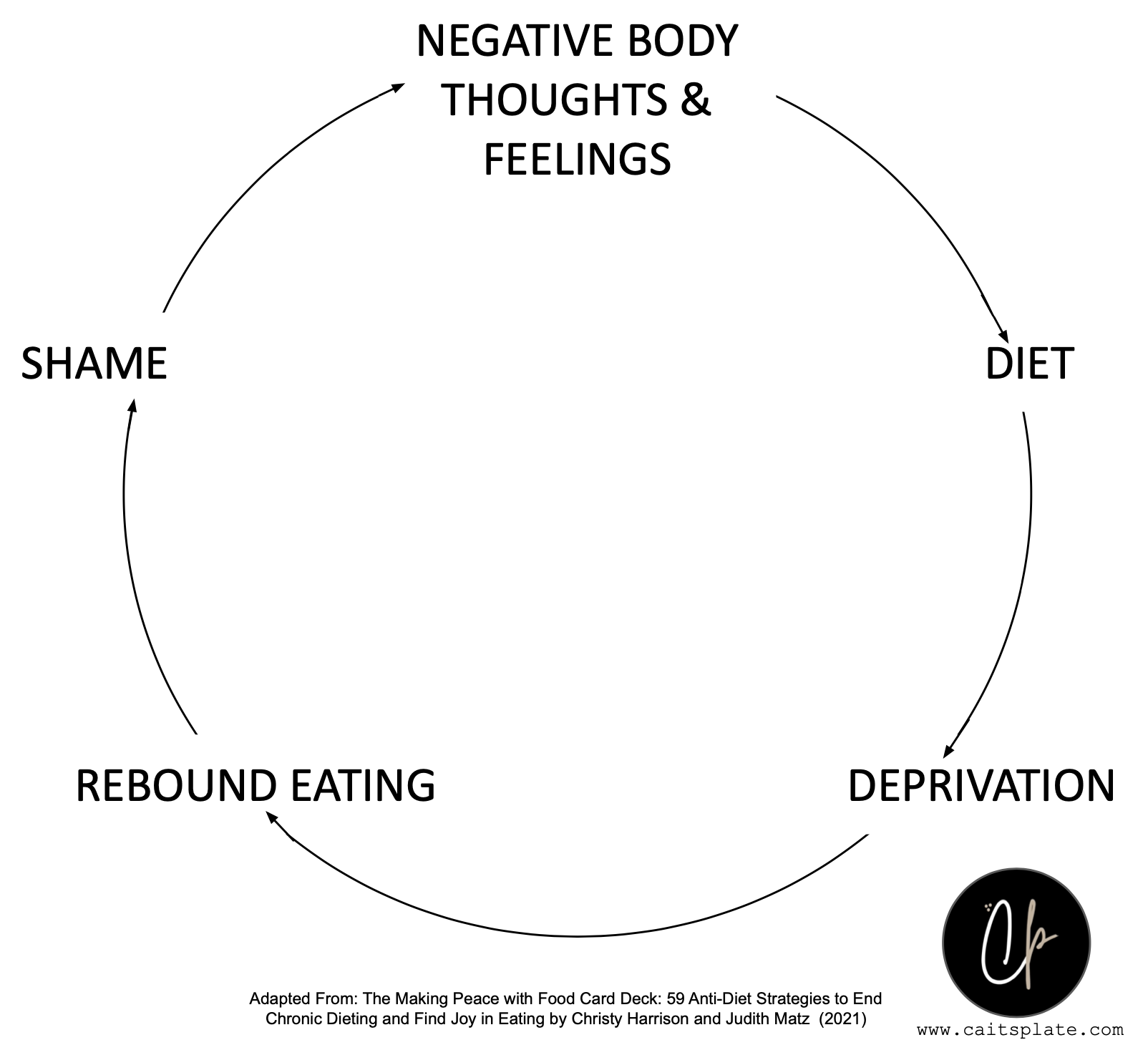Here’s the thing: most diets offer short-term wins. We wouldn’t, as a society, keep trying diets if we never saw any ‘success.’ Whether it’s a sense of elation at sticking to a diet plan, pride at seeing some body change or a general felt sense of well-being, these little things during the initial diet phase make us feel like the diet ‘worked.’
The problem is, those early ‘successes’ are short-term and all too quickly turn to deprivation, guilt, shame, self-critique and over time, worsened physical and mental well-being.
This is what’s referred to as the diet-rebound cycle.

I’m sure by now you’ve caught onto the fact that diet culture thrives on self-criticism, guilt and shame. It could not exist without those things because it’s only through shaming and demoralizing the individual that it’s able to continue selling a faulty solution (diets) to a non-existent problem (the need to change our size and shape).
Diet culture messaging instills in us from an early age that there’s a ‘right’ way to have a body. From there, it provides its plans, protocols and lifestyles as the path to achieving it. Since we’re so conditioned to believe our bodies are wrong and in need of fixing, we’re obviously game to try their ‘solutions.’ Thus begins the diet-rebound cycle.
We go on a diet (or now-a-days the ‘it’s not a diet, it’s a lifestyle’ plan) and on said diet we’re told to avoid many foods we innately enjoy. After some time, this leaves us feeling incredibly deprived. And most often, it not only makes us feel deprived, it causes an obsession with all the foods we ‘can’t’ have (it’s human nature to want what you can’t have – just witness the reaction of any toddler who has been told ‘no’).
From there, we experience rebound eating – eating to make up for restriction (aka – your body’s natural biological response to deprivation). Rebound eating can feel out of control because the biological signals driving us to eat are so powerful. We need food to live and our bodies aren’t afraid to let us know when they’re not getting enough.
This lack of control then causes us to feel a lot of guilt and shame – not only did we break our diets, we say, but something surely must be wrong with us for lacking the ‘willpower’ to stop ourselves eating all those foods we’ve worked so hard to avoid plus some!
STOP & CONSIDER:
We know that diets don’t work long-term for the majority of people (about 95%).
Imagine any other situation in life where you were given something that had only a 5% chance of working. If you tried it and it didn’t work, would you blame yourself? Would you continue using it?
Consider this next time you’re tempted to feel guilt & shame over a failed diet attempt.
It’s not you that failed the diet, it’s the diet that failed you.
All of that – breaking our diet, eating in a way that felt out of control, the resultant self-beratement, shame and guilt leads us back to those negative body thoughts and feelings. And once we get back there, there’s only one viable next step – go back on a diet.
So, you can see how easy it is to get swept up into and subsequently trapped in the diet-rebound cycle. Diet culture has filled our minds (and our collective society) with messaging that praises and exalts a certain body type (one, it’s worth noting, nearly no one has), then traps us in a never-ending cycle of trying to ‘fix’ our bodies to fit that mold (these days, that messaging is veiled under the guise of ‘health’). All the while, the most likely result of being stuck in that cycle is a damaged relationship with food, body and movement, leading to decline in overall well-being.
Just as with breaking free from the diet mindset, understanding the diet-rebound cycle and all its many harms is a crucial part of making peace with food and body. When you’re able to stop blaming yourself for diet culture’s failures, you can break free from that toxic cycle and move forward in your journey towards a more calm relationship with food and body.
References:
- Christy Harrison and Judith Matz. The Making Peace with Food Card Deck: 59 Anti-Diet Strategies to End Chronic Dieting and Find Joy in Eating (2021).
Leave a Reply